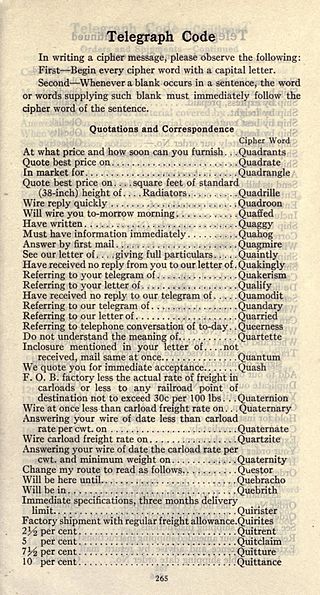
A euphemism is an innocuous word or expression used in place of one that is deemed offensive or suggests something unpleasant. Some euphemisms are intended to amuse, while others use bland, inoffensive terms for concepts that the user wishes to downplay. Euphemisms may be used to mask profanity or refer to topics some consider taboo such as disability, sex, excretion, or death in a polite way.
Pig Latin is a language game or argot in which words in English are altered, usually by adding a fabricated suffix or by moving the onset or initial consonant or consonant cluster of a word to the end of the word and adding a vocalic syllable to create such a suffix. For example, Wikipedia would become Ikipediaway. The objective is to conceal the words from others not familiar with the rules. The reference to Latin is a deliberate misnomer; Pig Latin is simply a form of argot or jargon unrelated to Latin, and the name is used for its English connotations as a strange and foreign-sounding language. It is most often used by young children as a fun way to confuse people unfamiliar with Pig Latin.
A backronym is an acronym formed from an already existing word by expanding its letters into the words of a phrase. Backronyms may be invented with either serious or humorous intent, or they may be a type of false etymology or folk etymology. The word is a portmanteau of back and acronym.
An idiom is a phrase or expression that typically presents a figurative, non-literal meaning attached to the phrase. Some phrases which become figurative idioms, however, do retain the phrase's literal meaning. Categorized as formulaic language, an idiom's figurative meaning is different from the literal meaning. Idioms occur frequently in all languages; in English alone there are an estimated twenty-five million idiomatic expressions.

A synonym is a word, morpheme, or phrase that means exactly or nearly the same as another word, morpheme, or phrase in a given language. For example, in the English language, the words begin, start, commence, and initiate are all synonyms of one another: they are synonymous. The standard test for synonymy is substitution: one form can be replaced by another in a sentence without changing its meaning. Words are considered synonymous in only one particular sense: for example, long and extended in the context long time or extended time are synonymous, but long cannot be used in the phrase extended family. Synonyms with exactly the same meaning share a seme or denotational sememe, whereas those with inexactly similar meanings share a broader denotational or connotational sememe and thus overlap within a semantic field. The former are sometimes called cognitive synonyms and the latter, near-synonyms, plesionyms or poecilonyms.
Obfuscation is the obscuring of the intended meaning of communication by making the message difficult to understand, usually with confusing and ambiguous language. The obfuscation might be either unintentional or intentional, and is accomplished with circumlocution, the use of jargon, and the use of an argot of limited communicative value to outsiders.
A glittering generality or glowing generality is an emotionally appealing phrase so closely associated with highly valued concepts and beliefs that it carries conviction without supporting information or reason. Such highly valued concepts attract general approval and acclaim. Their appeal is to emotions such as love of country and home, and desire for peace, freedom, glory, and honor. They ask for approval without examination of the reason. They are typically used in propaganda posters/advertisements and used by propagandists and politicians.

A weasel word, or anonymous authority, is a word and phrase aimed at creating an impression that something specific and meaningful has been said when in fact only a vague, ambiguous, or irrelevant claim has been communicated. The terms may be considered informal. Examples include the phrases "some people say", "it is thought", and "researchers believe". Using weasel words may allow one to later deny any specific meaning if the statement is challenged, because the statement was never specific in the first place. Weasel words can be a form of tergiversation and may be used in advertising, (popular) science, opinion pieces and political statements to mislead or disguise a biased view or unsubstantiated claim.
"Person of interest" is a term used by law enforcement in the United States, Canada, and other countries when identifying someone possibly involved in a criminal investigation who has not been arrested or formally accused of a crime. It has no legal meaning, but refers to someone in whom the police are "interested", either because the person is cooperating with the investigation, may have information that would assist the investigation, or possesses certain characteristics that merit further attention.

A crash cart or code cart or "MAX cart" is a set of trays/drawers/shelves on wheels used in hospitals for transportation and dispensing of emergency medication/equipment at site of medical/surgical emergency for life support protocols (ACLS/ALS) to potentially save someone's life. The cart carries instruments for cardiopulmonary resuscitation and other medical supplies while also functioning as a support litter for the patient.
"Inspector Sands" is a code phrase used by public transport authorities in the United Kingdom, including Network Rail and London Underground, to alert staff to a fire alarm without needing to evacuate the station. The exact wording depends on the station and the nature of the incident. For example: "Would Inspector Sands please report to the operations room immediately." or "Would Inspector Sands please report to Platform 2."
Hospital emergency codes are coded messages often announced over a public address system of a hospital to alert staff to various classes of on-site emergencies. The use of codes is intended to convey essential information quickly and with minimal misunderstanding to staff while preventing stress and panic among visitors to the hospital. Such codes are sometimes posted on placards throughout the hospital or are printed on employee identification badges for ready reference.
Ugandan English, also colloquially referred to as Uglish, is the variety of English spoken in Uganda. Aside from Uglish, other colloquial portmanteau words are Uganglish and Ugandlish (2010).
The five most common Cantonese profanities, vulgar words in the Cantonese language are diu (屌/𨳒), gau (鳩/㞗/𨳊), lan (撚/𨶙), tsat (柒/杘/𨳍) and hai (屄/閪), where the first ("diu") literally means fuck, "hai" is a word for female genitalia and "gau" refers to male genitalia. They are sometimes collectively known as the "outstanding five in Cantonese" (廣東話一門五傑). These five words are generally offensive and give rise to a variety of euphemisms and minced oaths. Similar to the seven dirty words in the United States, these five words are forbidden to say and are bleep-censored on Hong Kong broadcast television. Other curse phrases, such as puk gai (仆街/踣街) and ham gaa caan (冚家鏟/咸家鏟), are also common.
The following is a list of words and formulations commonly used as profanity throughout Romania.
A pejorative word or phrase, slur, or derogatory term is a word or grammatical form expressing a negative or a disrespectful connotation, a low opinion, or a lack of respect toward someone or something. It is also used to express criticism, hostility, or disregard. Sometimes, a term is regarded as pejorative in some social or ethnic groups but not in others or may be originally pejorative but later adopt a non-pejorative sense in some or all contexts.

In telecommunication, a commercial code is a code once used to save on cablegram costs. Telegraph charged per word sent, so companies which sent large volumes of telegrams developed codes to save money on tolls. Elaborate commercial codes which encoded complete phrases into single words were developed and published as codebooks of thousands of phrases and sentences with corresponding codewords. Commercial codes were not generally intended to keep telegrams private, as codes were widely published; they were usually cost-saving measures only.
In modern usage, retard is a pejorative term either for someone with a mental disability or for someone who is considered stupid, slow to understand, or ineffective in some way. The adjective retarded is in the same way used for something very foolish or stupid. Because it is now considered offensive, the word is commonly referred to by the euphemisms "r-word" and "r-slur".
"He never married" was a phrase used by British obituary writers as a euphemism for the deceased having been homosexual. Its use has been dated to the second half of the 20th century, and it may be found in coded and uncoded forms, such as when the subject never married but was not homosexual. A similar phrase is "confirmed bachelor".

Tagalog profanity can refer to a wide range of offensive, blasphemous, and taboo words or expressions in the Tagalog language of the Philippines. Due to Filipino culture, expressions which may sound benign when translated back to English can cause great offense; while some expressions English speakers might take great offense to can sound benign to a Tagalog speaker. Filipino, the national language of the Philippines, is the standard register of Tagalog, so as such the terms Filipino profanity and Filipino swear words are sometimes also employed.





